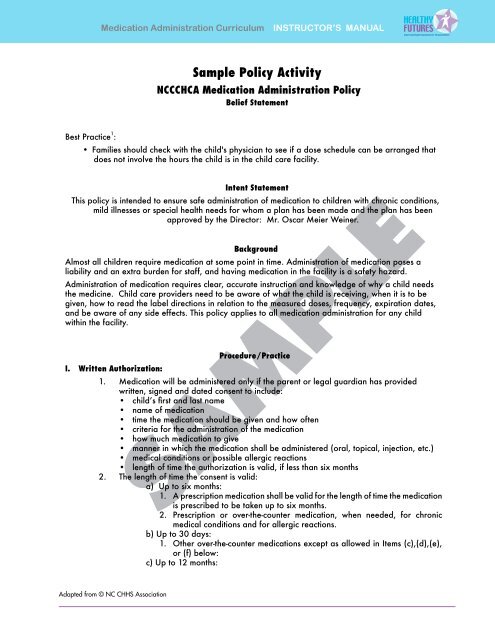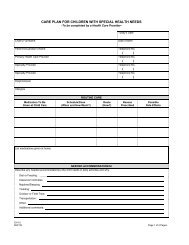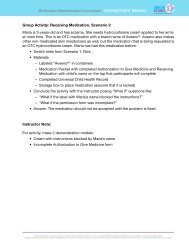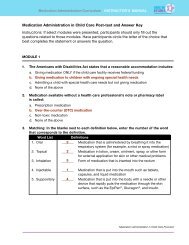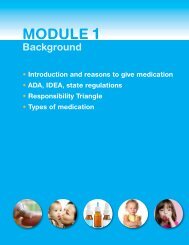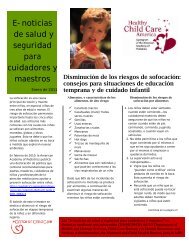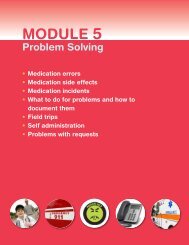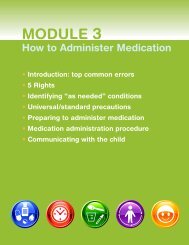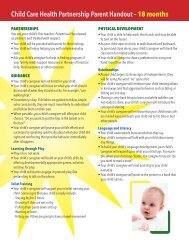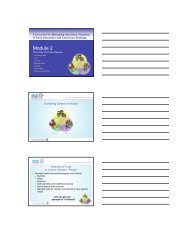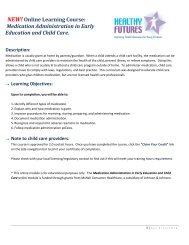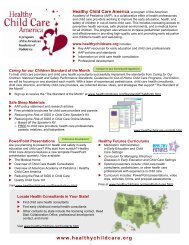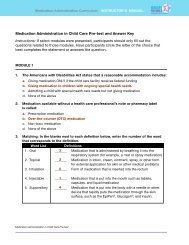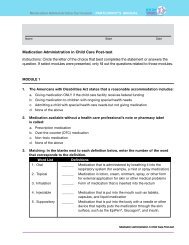Sample Policy Activity - Healthy Child Care America
Sample Policy Activity - Healthy Child Care America
Sample Policy Activity - Healthy Child Care America
You also want an ePaper? Increase the reach of your titles
YUMPU automatically turns print PDFs into web optimized ePapers that Google loves.
Medication Administration Curriculum INSTRUCTOR’S MANUAL<strong>Sample</strong> <strong>Policy</strong> <strong>Activity</strong>NCCCHCA Medication Administration <strong>Policy</strong>Belief StatementBest Practice 1 :• Families should check with the child's physician to see if a dose schedule can be arranged thatdoes not involve the hours the child is in the child care facility.Intent StatementThis policy is intended to ensure safe administration of medication to children with chronic conditions,mild illnesses or special health needs for whom a plan has been made and the plan has beenapproved by the Director: Mr. Oscar Meier Weiner.BackgroundAlmost all children require medication at some point in time. Administration of medication poses aliability and an extra burden for staff, and having medication in the facility is a safety hazard.Administration of medication requires clear, accurate instruction and knowledge of why a child needsthe medicine. <strong>Child</strong> care providers need to be aware of what the child is receiving, when it is to begiven, how to read the label directions in relation to the measured doses, frequency, expiration dates,and be aware of any side effects. This policy applies to all medication administration for any childwithin the facility.Procedure/PracticeI. Written Authorization:1. Medication will be administered only if the parent or legal guardian has providedwritten, signed and dated consent to include:• childʼs first and last name• name of medication• time the medication should be given and how often• criteria for the administration of the medication• how much medication to give• manner in which the medication shall be administered (oral, topical, injection, etc.)• medical conditions or possible allergic reactions• length of time the authorization is valid, if less than six months2. The length of time the consent is valid:a) Up to six months:1. A prescription medication shall be valid for the length of time the medicationis prescribed to be taken up to six months.2. Prescription or over-the-counter medication, when needed, for chronicmedical conditions and for allergic reactions.b) Up to 30 days:1. Other over-the-counter medications except as allowed in Items (c),(d),(e),or (f) below:c) Up to 12 months:Adapted AssociationSAMPLEfrom © NC CHHS
Medication Administration Curriculum INSTRUCTOR’S MANUAL1. To apply over-the-counter, topical ointments, gels, lotions, creams, orpowders such as sunscreen, diapering creams, baby lotion, baby powder,insect repellant or teething gel to a child, when needed.d) Valid for as long as the child is enrolled:1. Standing authorization to administer an over-the-counter medication asdirected by the North Carolina State Health Director or designee, whenthere is a public health emergency as identified by the North CarolinaState Health Director or designee. This permission will include a statementthat the authorization is valid until withdrawn by the parent/guardian inwriting.e) At any time:1. A parent/guardian may withdraw his or her written authorizationfor the administration of medications at any time in writing.f) Standing authorization: (option to omit for best practice)1. A written statement signed by the parent/guardian may give standingauthorization for a one time weight appropriate dose of acetaminophen ifthe child has a fever and the parent/guardian can not be reached.3. If any question arises concerning whether medication provided by the parent/guardianshould be given, a physicianʼs note must accompany the medication.4. Exception to Authorization:A caregiver may administer medication to a child without parental authorizationin the event of an emergency medical condition when the childʼs parent/guardianis unavailable. The medication must be administered with the authorization and inaccordance with instructions from a bona fide medical care provider.2Adapted AssociationSAMPLE3II. Prescription Medication:Prescription medications such as antibiotics, seizure medications or others:1. Must be administered only to the child for whom they were prescribed.2. Must be in its original child resistant container labeled by a pharmacist to include:• childʼs first and last name• name of medication• date prescription was filled• name of health professional who wrote the prescription• medication expiration date, storage information• instructions on administration: dosage amount, frequency, and specific indications for“as needed”. (An accompanying sheet with this written information is acceptable.It must bear the childʼs name and be signed and dated by the physician.) Seedefinitions section for more information.3. Pharmaceutical samples must be stored in the manufacturerʼs original packaging, mustbe labeled with the childʼs name, and shall be accompanied by written instructions asfor all prescriptions.III. Over-the-Counter Medications:3Over-the-Counter (OTC ) medications such as cough syrup, decongestant, acetaminophen,ibuprofen, topical antibiotic cream for abrasions, or medication for intestinal disorders:1. Must be in the original container labeled by the parent or legal guardian with thechildʼs first and last names.2. Must be accompanied by written instructions signed and dated by the parent orguardian specifying:• child's first and last name• name of the medication• conditions for use• dose of the medication• how often the medication may be given• manner in which the ointments, repellents, lotions, creams, and powdersshall be applied• any precautions to follow• length of time the authorization is validfrom © NC CHHS
Medication Administration Curriculum INSTRUCTOR’S MANUAL3. Administered as authorized with specific, legible written instructions by the parentor legal guardian not to exceed amounts and frequency of dosage specified by themanufacturer.4. If manufacturerʼs instructions include consultation with a physician for dose oradministration instructions, written dosage instructions from a licensed physician orauthorized health professional is required.IV. Medication will not be given if it is:21. not in the original container2. beyond the date of expiration on the container3. without written authorization4. beyond expiration of the parental or guardian consent5. without the written instructions provided by the physician or other health professional legallyauthorized to prescribe medication6. in any manner not authorized by the childʼs parent/guardian, physician or other healthprofessional7. for non-medical reasons, such as to induce sleepV. Receipt, Storage and Disposal:Adapted AssociationSAMPLE1,2,51. All medications brought in to the center will be given to the Director for review andapproval.2. Medications will be stored in a sturdy, child-resistant, locked container that is inaccessible tochildren and prevents spillage.3. Medications will be stored at the temperature recommended for that type of medication.It shall not be stored above food. A lock box can be kept in a designated refrigerator notaccessible to children to hold medications.4. Emergency medication may be left unlocked so long as they are stored out of the reach ofchildren at least 5 feet above the floor.5. Non-prescription diaper creams shall be stored out of reach of children at least 5 feet abovethe floor, but are not required to be in locked storage.6. Any medication remaining after the course of treatment is completed or authorization iswithdrawn will be returned to the parent/guardian within 72 hours or it will be discarded.Contact your <strong>Child</strong> <strong>Care</strong> Health Consultant or Health Department for instructions on how toproperly discard. If discarded, another staff will witness and sign to the fact it was discardedand how it was discarded.VI. Training:11. Only staff persons who have documentation of medication administration training by alicensed health care professional will administer medication.2. A staff member trained in medication administration will be on site at all times when childrenare present.VII. Documentation:21. A medication log will be maintained in the childʼs file by the facility staff to record any timeprescription or over-the-counter medication is administered by child care facility personnel.2. The childʼs name, date, time, amount and type of medication given, and the nameand signature of the person administering the medication shall be recorded for eachadministration.3. The log may be part of the medication permission slip or on a separate form developed bythe provider which includes the required information.4. Only one medication shall be listed on each form.5. Spills, reactions, and refusal to take medication will be noted on this log.6. No documentation shall be required when over-the-counter, topical ointments, gels, lotions,creams, and powders --- such as sunscreen, diapering creams, baby lotion, baby powder,topical teething products, or insect repellents --- are applied to children.VII. Medication Error:21. In the event of a medication error, the appropriate first aid or emergency action will betaken.from © NC CHHS
Medication Administration Curriculum INSTRUCTOR’S MANUALAdapted from © NC CHHS Association
Medication Administration Curriculum INSTRUCTOR’S MANUALNC <strong>Policy</strong> Review: What is missing?Instructions: Review a NC MA <strong>Policy</strong>. Put a check to see if the policy elements listed on this page are present in thepolicy.TitleBelief StatementIntent StatementBackgroundProceduresAuthorizationPrescriptionOTCReceiptStorageDisposalTrainingDocumentationErrorApplicableCommunicationReferencesReviewed byEffective DateReview DateAdapted from © 2006 UNC-CH/MCH and NC DHHS/DCD
Medication Administration Curriculum INSTRUCTOR’S MANUALMedication Administration <strong>Policy</strong> Checklisto Title: A couple of words that describe the content of the policy plus a numerical code, ifapplicable.o Belief Statement: A brief statement about why the center believes the policy is necessary. Afacility may include policy options, best practice or NC law. (Example: XYZ <strong>Child</strong> <strong>Care</strong> believesall children have the right to safe medication administration practices in child care.)o Intent Statement: An explanation of the purpose of the policy. (Example: This policy is intendedto prevent errors in medication administration and provide child care providers with a plan incase of an emergency.)o Background: A description of why the policy was developed. Not every policy will have abackground statement.o Procedure/Practice: Action steps necessary to accomplish what the policy recommends.- Written Authorization- Prescription Medication- Receipt- Disposal- Training/Who will give medication- Written/Telephone Instructions- Over-the-Counter Medication- Storage- Documentation- Medication Erroro Applicable: To whom does the policy apply? (<strong>Child</strong>ren, staff, families, etc)o Communication: How are families/staff informed about the policy? (Parent handbook,newsletter, etc)o References: What information was used to develop the policy or procedure? (Books, journalarticles, Internet sources, etc)o Review: Who reviews policies at the center? (Director, CCHC, legal advisor, board, policycouncil, etc.) Each of these people need a professional signature and date.o Effective Date: When will the policy be put into effect?o Review Date: How often will the center review the policy? (Every 6 months, every year, etc)Adapted from © 2006 UNC-CH/MCH and NC DHHS/DCD


